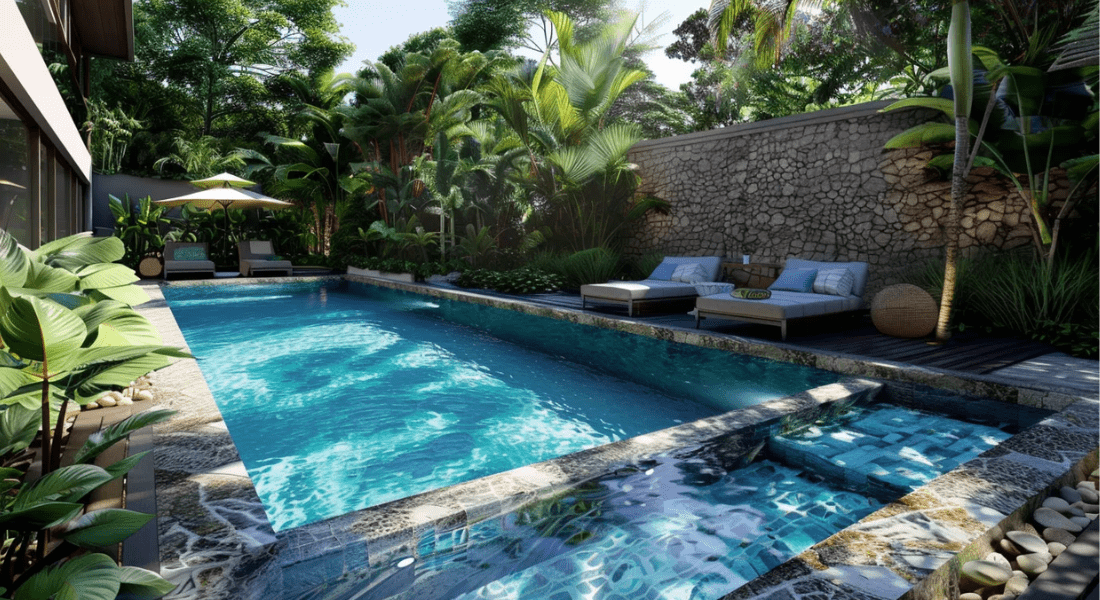With so many different types of pools available, it’s easy to get stuck wondering which one is best for your home. Should you go for the classic inground pool, a budget-friendly above-ground option, or maybe something more unique like a natural pool?
But here’s the thing: picking the wrong type of pool can lead to costly mistakes, high maintenance, or even a pool that doesn’t quite fit your lifestyle. That’s where this guide comes in. We’ll break down the most popular pool types, highlight their pros and cons, and help you find the perfect pool for your needs. Ready to dive in? Let’s go!
What Are the Main Types of Swimming Pools?
Inground Pools
Inground pools are a top choice for many homeowners. They’re durable and offer a wide range of design options. These pools are built right into the ground, making them a permanent fixture in your backyard.
Above-Ground Pools
If you’re looking for a budget-friendly option, above-ground pools are great. They’re less expensive, easier to install, and perfect if you want something more temporary.
Fiberglass Pools
Fiberglass pools are known for their quick installation and low maintenance. These pools arrive at your home pre-molded and ready to be placed into the ground, saving you time and effort.
Vinyl Liner Pools
Vinyl liner pools offer flexibility in design and are generally more budget-friendly. However, keep in mind that the liner will need to be replaced every few years.
Concrete Pools
Concrete pools are the most customizable, allowing you to create any shape or size you want. They do require more upkeep and tend to be the most expensive.
How to Choose the Best Type of Pool for Your Home?
Consider Your Budget
Your budget plays a major role in your pool choice. Concrete pools offer endless customization but come with a higher price tag and more maintenance. On the other hand, vinyl liner pools are more affordable upfront but may cost more in the long run due to liner replacements.
Think About Space and Aesthetic Preferences
If you have a specific vision for your pool, concrete might be your best bet. You can design it to match your exact style, whether it’s modern or natural. If ease of maintenance is important, fiberglass pools offer a smooth surface that resists algae, requiring less cleaning.
Maintenance Willingness
If you’re not keen on regular upkeep, fiberglass pools are easier to maintain. Vinyl liner pools are more budget-friendly but remember, the liner needs replacing every five to ten years. Concrete pools require the most maintenance but offer the most design freedom.
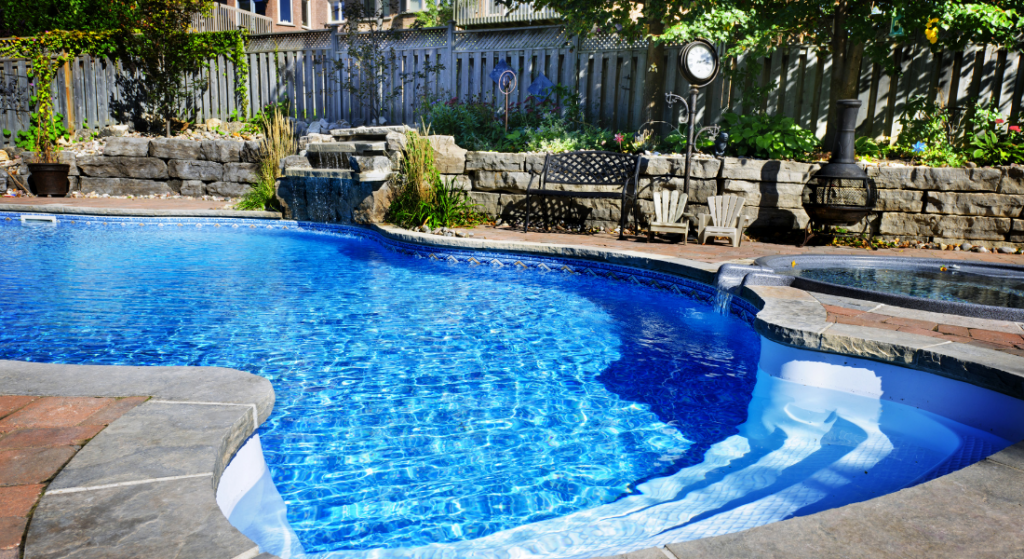
What Are the Benefits of an Inground Pool?
Inground pools are a classic choice for a reason. They’re durable, attractive, and can be designed to fit almost any backyard. These pools are built into the ground, which gives them a polished, seamless look that can really elevate the aesthetic of your outdoor space.
One of the biggest benefits of an inground pool is its longevity. These pools are built to last, so you can enjoy them for many years with proper maintenance. They also come in various materials, including fiberglass, vinyl liner, and concrete, each offering different advantages.
Another perk? Inground swimming pools can add value to your home. A well-designed pool can be a major selling point if you ever decide to move, making it an investment in both your enjoyment and your property’s worth.
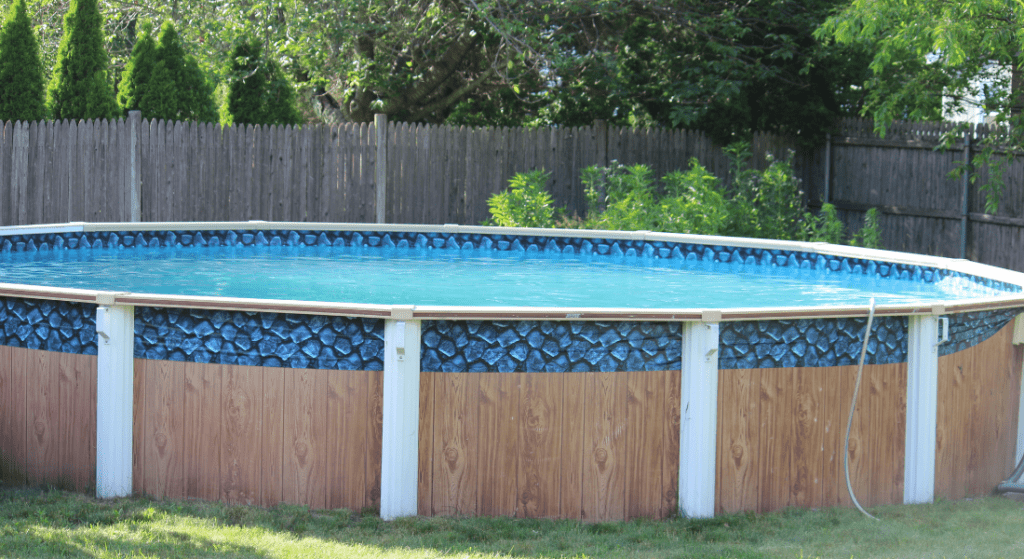
Why Consider an Above-Ground Pool?
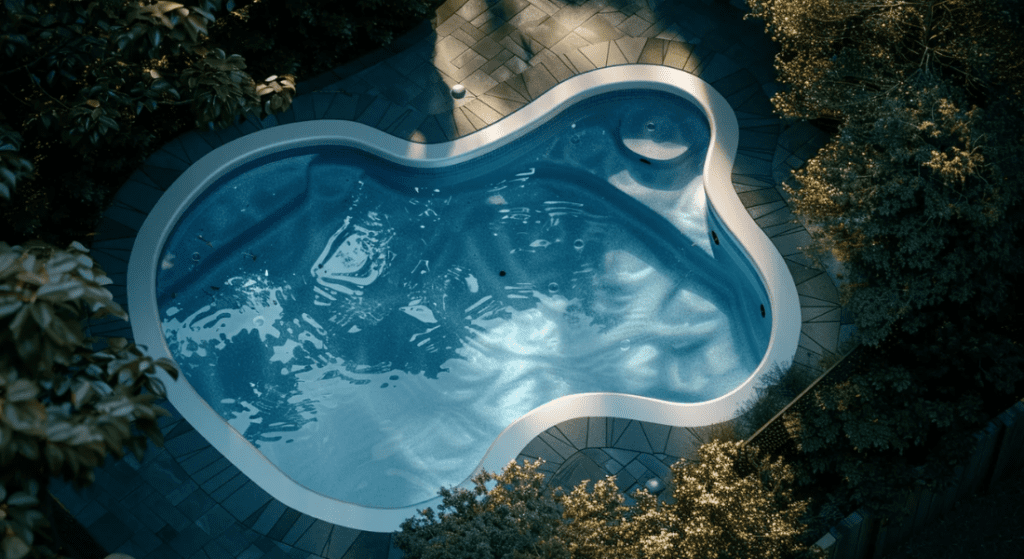
What Are the Advantages of a Fiberglass Pool?
If you’re looking for a pool that’s easy to maintain and quick to install, a fiberglass pool could be the perfect fit. These pools are made from a single piece of molded fiberglass, which is delivered to your home and installed in one go. This means you can have your pool up and running in a fraction of the time it takes to build a concrete pool.
One of the biggest advantages of a fiberglass pool is its smooth surface. This smoothness makes it harder for algae to cling to the walls, which means less time spent scrubbing and more time enjoying your pool. Plus, fiberglass is a durable material that doesn’t crack easily, so you’ll have fewer repairs to worry about over the years.
Fiberglass swimming pools come in a variety of pre-designed shapes and sizes. While this might limit your options for customization, it also means you don’t have to worry about the construction process—just pick a design you like, and you’re good to go.
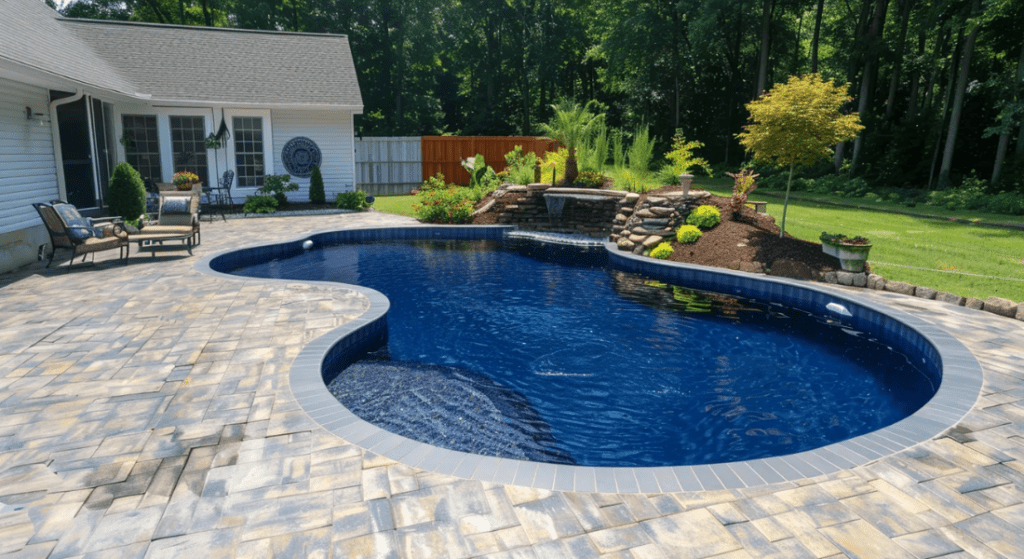
Is a Vinyl Liner Pool Right for You?
Vinyl liner pools are a popular choice for those who want a custom-looking pool without breaking the bank. These pools are built with a vinyl liner that fits into a frame made of materials like steel, aluminum, or polymer. The result is a pool that can be shaped and sized to your liking at a more affordable price.
One of the great things about a vinyl liner pool is its design flexibility. You can choose from various shapes and sizes, which allows you to create a pool that fits your backyard perfectly. This is a big plus if you have a specific vision in mind but need to stick to a budget.
However, it’s important to remember that the vinyl liner will need replacing every five to ten years. This adds to the long-term costs, but the initial installation is generally less expensive than other types of pools, making it a good option if you’re looking for an affordable custom pool.
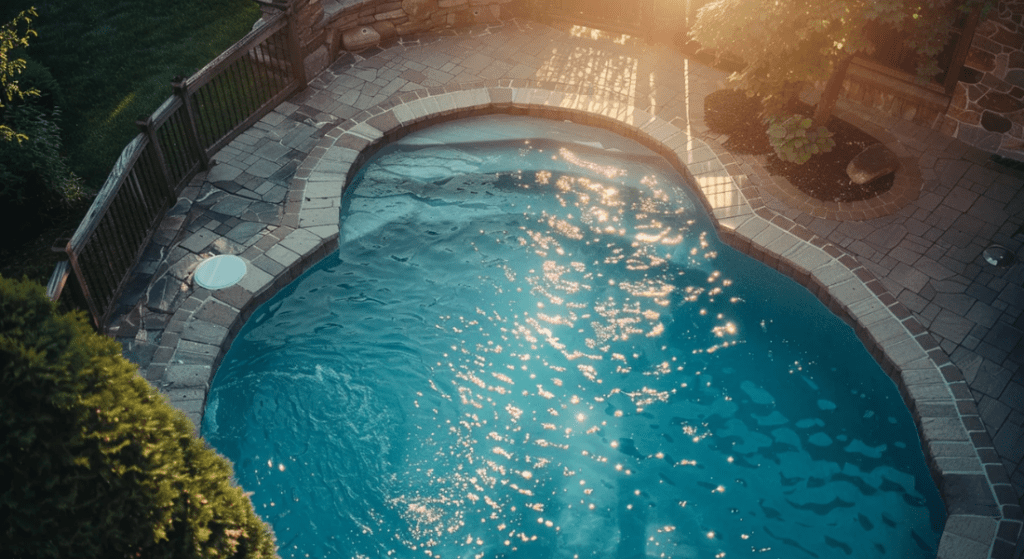
Concrete Pools: Are They Worth the Investment?
Concrete pools are often seen as the gold standard in pool design due to their durability and limitless customization options. These pools are built by pouring concrete into a steel-reinforced frame, allowing you to create any shape or size you want. If you have a unique vision for your pool, a concrete pool might be the best choice for bringing it to life.
The biggest advantage of concrete pools is their customizability. Whether you want a sleek, modern design or a more natural, freeform shape, concrete pools can be tailored to fit your exact specifications. This makes them an ideal option for homeowners who want a pool that truly reflects their style and complements their home.
However, concrete pools do require more maintenance than other types of pools. The surface needs to be re-plastered every 10 to 15 years, and the porous nature of concrete means that these pools require more chemical treatments to prevent algae growth. But if you’re willing to invest the time and money, a concrete pool can be a stunning and long-lasting addition to your home.
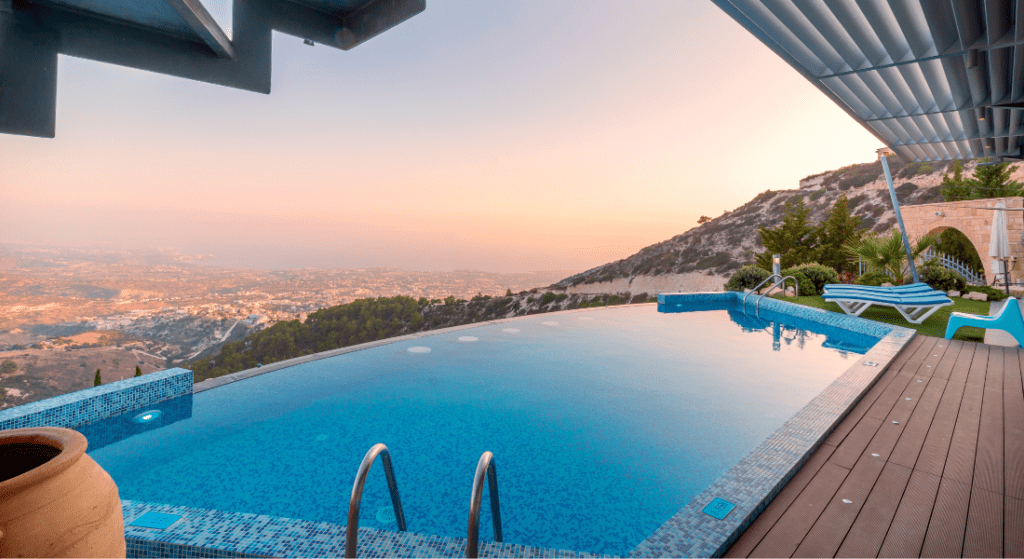
What Are the Features of an Infinity Pool?

Should You Opt for a Natural Pool?
Natural pools are an eco-friendly alternative to traditional swimming pools. These pools use biological filters and plants to keep the water clean, eliminating the need for harsh chemicals like chlorine. If you’re looking for a pool that blends seamlessly with the natural environment and supports a healthy ecosystem, a natural pool could be a great choice.
One of the main benefits of a natural pool is its environmental sustainability. The natural filtration system not only keeps the water clean but also creates a balanced ecosystem that supports plant and animal life. This makes natural pools an ideal choice for homeowners who are environmentally conscious and want to reduce their carbon footprint.
Natural pools are also known for their aesthetic appeal. The combination of water plants, natural stones, and a freeform design creates a tranquil, pond-like environment that blends beautifully with the surrounding landscape. However, natural pools require more space and careful planning to ensure the filtration system works effectively.
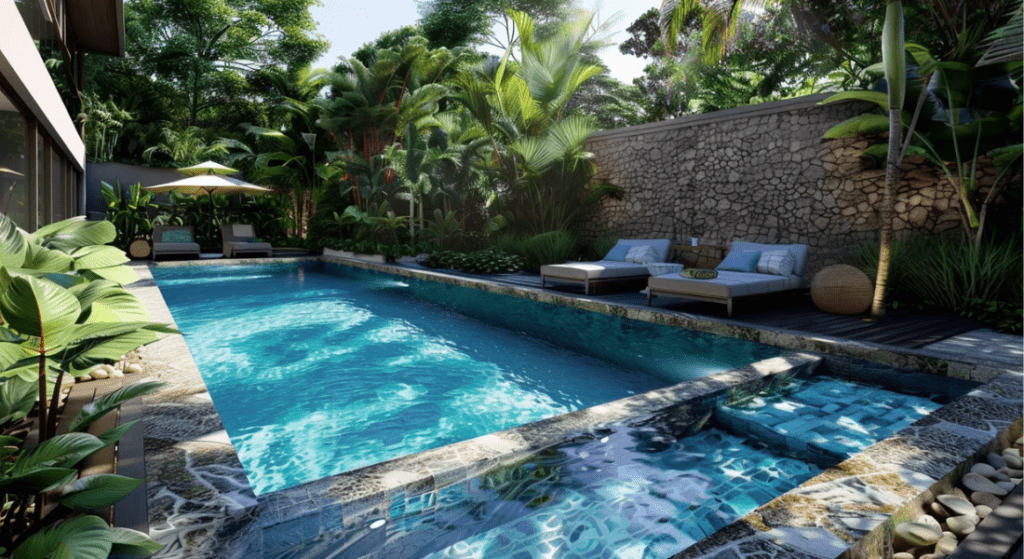
How Do Saltwater Pools Compare to Other Types?
Saltwater pools are a popular alternative to traditional chlorinated pools, offering a gentler swimming experience with lower levels of harsh chemicals. Instead of adding chlorine directly to the water, saltwater pools use a salt-chlorine generator to convert salt into chlorine, which then disinfects the water.
The main advantage of a saltwater pool is its lower maintenance. The salt-chlorine generator produces a consistent level of chlorine, reducing the need for frequent chemical adjustments. This results in water that is softer on the skin and eyes, making swimming more comfortable for you and your family.
While saltwater pools tend to have higher initial installation costs, they can save you money in the long run by reducing the need for chemical purchases. However, it’s important to choose pool materials that can withstand the corrosive effects of salt to avoid damage over time.
Transform Your Backyard with Sutton Pools
Create your dream backyard with Sutton Pools’ professional pool installation services! Whether you want a stylish inground pool or a beautiful kidney-shaped design, we take care of everything from start to finish. Located in Clarksville, TN, we ensure your pool is always clean, clear, and ready for fun. Contact us today to build your dream pool!
Summary: Key Points to Remember
- Inground pools are durable and customizable, offering a wide range of design options that can add value to your home.
- Above-ground pools are affordable and flexible, with the added benefit of easy installation and portability.
- Fiberglass pools offer low maintenance and quick installation, with a smooth surface that resists algae growth.
- Vinyl liner pools are budget-friendly and customizable but require liner replacement every five to ten years.
- Concrete pools provide endless customization possibilities but require significant maintenance and have higher long-term costs.
- Infinity pools create a stunning visual effect but are more expensive and require specific topography.
- Natural pools are eco-friendly and blend beautifully with landscapes, but need more space and planning.
- Saltwater pools offer a gentler swimming experience with lower chemical maintenance but have higher initial costs and potential material corrosion.
Choosing the right pool type for your home is all about balancing your budget, space, and lifestyle. Whether you’re looking for a simple above-ground pool or a luxurious infinity pool, there’s a perfect option out there waiting for you. Take your time, consider your options, and soon you’ll be enjoying the pool of your dreams!
FAQ
Q. How many types of pools are there?
A. There are several types of pools, with the most common being inground pools, above-ground pools, fiberglass pools, vinyl liner pools, and concrete pools. Other specialized types include infinity pools, natural pools, and saltwater pools.
Q. What are the three types of pool water?
A. The three main types of pool water are chlorinated water, salt water, and natural water. Chlorinated pools use chemicals to sanitize the water, saltwater pools use a salt-chlorine generator, and natural pools rely on biological filtration.
Q. What type of pool is best?
A. The best type of pool depends on your needs and preferences. Fiberglass pools are great for low maintenance, concrete pools offer unlimited customization, and vinyl liner pools are budget-friendly. Consider your budget, space, and maintenance willingness to choose the best fit.
Q. What are the classifications of pools?
A. Pools can be classified based on construction (inground or above-ground), material (fiberglass, vinyl liner, concrete), and purpose (recreational, lap, infinity, natural, saltwater). Each classification offers different benefits and suits different needs.

